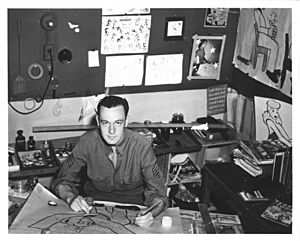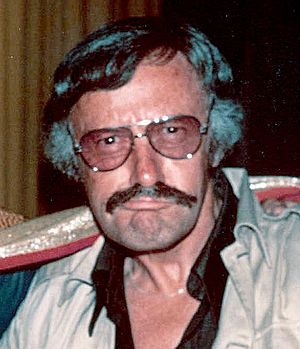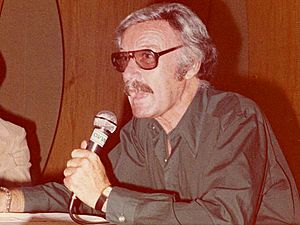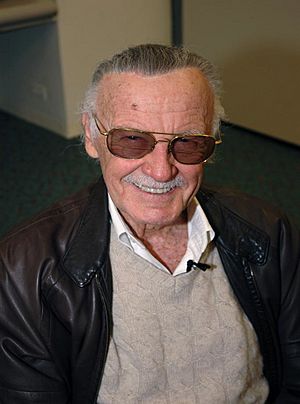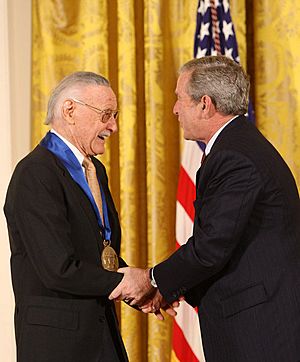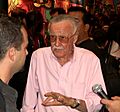Stan Lee facts for kids
Quick facts for kids Stan Lee |
|
|---|---|
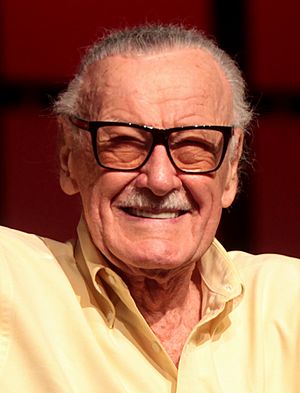
Lee in 2014
|
|
| Born | Stanley Martin Lieber December 28, 1922 New York City, New York, U.S. |
| Died | November 12, 2018 (aged 95) Los Angeles, California, U.S. |
| Nationality | American |
| Area(s) | Comic book writer, editor, publisher |
|
Notable collaborations
|
|
| Awards |
|
| Spouse(s) | |
| Children | 2 |
| Signature | |
 |
|
Stan Lee (born Stanley Martin Lieber December 28, 1922 – November 12, 2018) was a famous American comic book writer, editor, and publisher. He was the main creative leader for Marvel Comics for over 20 years.
Working with artists like Jack Kirby and Steve Ditko, Stan Lee helped create many popular characters. These include superheroes such as Spider-Man, the X-Men, Iron Man, Thor, the Hulk, the Fantastic Four, Black Panther, Daredevil, Doctor Strange, and Ant-Man.
Even after he retired from Marvel in the 1990s, he stayed a public face for the company. He often made cameo appearances (short, special appearances) in movies based on Marvel characters. He continued to work on new creative projects until he passed away in 2018.
Stan Lee was honored in the comic book industry's Will Eisner Award Hall of Fame in 1994. He was also added to the Jack Kirby Hall of Fame in 1995. In 2008, he received the National Medal of Arts from President George W. Bush. This award is one of the highest honors for artists in the United States.
Contents
Early Life and Inspiration
Stan Lee was born on December 28, 1922, in Manhattan, New York City. His parents, Celia and Jack Lieber, were Jewish immigrants from Romania. His father worked as a tailor but found it hard to find steady work after the Great Depression.
His family moved around Manhattan, living in areas like Washington Heights, Manhattan and later The Bronx. Stan Lee had one younger brother named Larry Lieber. From a young age, Stan Lee loved books and movies, especially those with heroic characters.
He went to DeWitt Clinton High School in the Bronx. Stan Lee enjoyed writing and dreamed of writing a "Great American Novel" someday. To earn money, he worked many part-time jobs. He wrote obituaries for newspapers and delivered sandwiches. He also worked at a theater and sold newspaper subscriptions. He finished high school early in 1939.
Starting His Career in Comics
In 1939, Stan Lee got a job as an assistant at a new company called Timely Comics. This company was owned by Martin Goodman and would later become Marvel Comics. Stan Lee's first tasks were simple. He made sure the artists had ink and got them lunch. He also proofread and erased pencil marks from finished pages.
He made his first comic book appearance in Captain America Comics #3 in May 1941. This is when he first used the name Stan Lee. He later explained that he used this pseudonym because he was embarrassed to have his real name, Stanley Martin Lieber, linked to comics. He still hoped to write serious novels one day.
Stan Lee's first superhero co-creation was the Destroyer in August 1941. During this time, known as the Golden Age of Comic Books, he also helped create characters like Jack Frost.
In 1941, at just 18 years old, Stan Lee became an interim editor. He quickly became the editor-in-chief of the comic book division. He also served as the art director for many years, until 1972.
Stan Lee joined the United States Army in early 1942. He worked in the Signal Corps, fixing communication equipment. Later, he moved to the Training Film Division. Here, he wrote manuals, made training movies, and drew cartoons. The army even called him a "playwright." He returned from his service in World War II in 1945.
In the mid-1950s, the company was known as Atlas Comics. Stan Lee wrote many different types of stories. These included romance, Westerns, science fiction, and horror. By the end of the 1950s, he was thinking about leaving the comic book field.
The Marvel Comics Revolution
In the late 1950s, DC Comics made superhero teams popular again with the Justice League. Because of this, Stan Lee was asked to create a new superhero team. His wife, Joan, told him to try writing stories he truly enjoyed. She said he had nothing to lose since he was thinking of changing careers anyway.
Stan Lee took his wife's advice. He created heroes who had flaws and real-life problems. Before this, many superheroes were shown as almost perfect.
The first superheroes Stan Lee and artist Jack Kirby created together were the Fantastic Four. They became very popular. This led Stan Lee and Marvel's artists to create many more heroes. With Jack Kirby, he co-created the Hulk, Thor, Iron Man, and the X-Men. With Bill Everett, he created Daredevil. With Steve Ditko, he created Doctor Strange and Marvel's most famous character, Spider-Man.
Stan Lee also created a shared universe. This meant that all the fictional heroes lived in the same world and could meet each other. Lee and Kirby even brought several of their new characters together to form the team The Avengers.
Stan Lee changed how comic books connected with their readers. He made sure that every story showed who wrote, drew, inked, and lettered it. He also wrote a special section called "Bullpen Bulletins." This section shared news about Marvel staff and upcoming stories in a friendly way. Stan Lee wanted fans to feel like the comic creators were their friends. He was proud that fans wrote letters addressing creators by their first names, like "Dear Stan and Jack."
In the 1960s, Stan Lee wrote, drew, and edited most of Marvel's series. He also wrote a monthly column called "Stan's Soapbox." He wrote a lot of promotional material, often ending with his famous motto, "Excelsior!" Stan Lee would brainstorm story ideas with the artist. Then, he would write a short summary instead of a full script. The artist would then draw the story based on this summary.
After Steve Ditko left Marvel in 1966, John Romita Sr. became Stan Lee's partner on The Amazing Spider-Man. Within a year, it became Marvel's best-selling comic. Lee and Romita's stories focused on Spider-Man's adventures and his social life. Their stories also touched on real-world issues like the Vietnam War and student protests. Stan Lee also created the Black Panther, who was the first black superhero in mainstream comics.
Stan Lee and artist John Buscema created The Silver Surfer series in August 1968. The next year, Lee and Gene Colan created the Falcon. He was the first African-American superhero in Captain America #117 in September 1969.
Stan Lee believed that comic books could be used to talk about social issues. He often wrote about topics like racism and bigotry. In 1972, Stan Lee stopped writing monthly comic books to become the publisher. His last issue of The Amazing Spider-Man was #110 in July 1972. His last Fantastic Four was #125 in August 1972.
Later Career and Public Figure
Stan Lee became a public face for Marvel Comics. He attended comic book conventions across America. He also gave talks at colleges and joined panel discussions. On January 3, 1977, Stan Lee created the Spider-Man newspaper comic strip. His last major work with Jack Kirby, The Silver Surfer: The Ultimate Cosmic Experience, was published in 1978. Stan Lee and John Buscema also created the first issue of The Savage She-Hulk in February 1980.
In 1981, Stan Lee moved to California. He wanted to work on Marvel's television and movie projects. For a short time, he was president of the entire company. However, he soon stepped down to become the publisher again. Stan Lee said that being president was too much about numbers and not enough about the creative work he loved.
Stan Lee stepped away from his regular duties at Marvel in the 1990s. He continued to receive an annual salary as Chairman Emeritus. In 1998, he started a new internet-based superhero studio called Stan Lee Media with Peter Paul.
After the success of the X-Men movie in 2000 and the Spider-Man movie, Stan Lee had a disagreement with Marvel. They settled their differences in 2005.
At the 2012 San Diego Comic-Con International, Stan Lee announced his YouTube channel, Stan Lee's World of Heroes. This channel featured shows created by Lee and other famous people. Stan Lee also wrote the book Zodiac, which came out in January 2015.
At the 2016 Comic-Con International, Stan Lee introduced his digital graphic novel Stan Lee's God Woke. The printed version won an award in 2017.
Stan Lee was an executive producer for most Marvel movies and TV shows. He made many cameo appearances in Marvel movies, especially those in the Marvel Cinematic Universe.
Personal Life
Stan Lee married Joan Clayton Boocock on December 5, 1947. In 1949, they bought a house on Long Island. Their daughter, Joan Celia "J. C." Lee, was born in 1950. Sadly, another daughter, Jan Lee, passed away shortly after birth in 1953.
The Lees lived in Hewlett Harbor, New York, from 1952 to 1980. They also owned a condominium in Manhattan for a few years. In 1981, they moved to Los Angeles and bought a home in West Hollywood, California.
In September 2012, Stan Lee had surgery to get a pacemaker. On July 6, 2017, his wife, Joan, passed away at age 95. They had been married for 69 years.
Stan Lee died at the age of 95 in Los Angeles, California, on November 12, 2018. He had been ill with pneumonia earlier that year.
Awards and Honors
Stan Lee received many awards for his work in comics and entertainment.
| Year | Award | Nominated work | Result |
|---|---|---|---|
| 1974 | Inkpot Award | Won | |
| 1994 | The Will Eisner Award Hall of Fame | ||
| 1995 | Jack Kirby Hall of Fame | ||
| 2002 | Saturn Award | The Life Career Award | |
| 2008 | National Medal of Arts | ||
| 2009 | Hugo Award | Hugo Award for Best Dramatic Presentation- Iron Man | Nominated |
| Scream Awards | Comic-Con Icon Award | Won | |
| 2011 | Hollywood Walk of Fame | ||
| 2012 | Visual Effects Society Awards | Lifetime Achievement Award | |
| Producers Guild of America | Vanguard Award | ||
| 2017 | National Academy of Video Game Trade Reviewers | Performance in a Comedy, Supporting |
Images for kids
-
Lee promoting Stan Lee's Kids Universe at the 2011 New York Comic Con
-
Lee and Kirby (bottom left) as themselves on the cover of The Fantastic Four #10 (January 1963). Art by Kirby and Dick Ayers.
See also
 In Spanish: Stan Lee para niños
In Spanish: Stan Lee para niños
 | John T. Biggers |
 | Thomas Blackshear |
 | Mark Bradford |
 | Beverly Buchanan |


